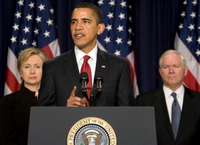To get a sense of what "complex operations" are, one need look no further than the kind of wars the U.S. fights when it intervenes overseas today. Unlike the total wars of the past, in which the U.S. military battled the national army of an enemy state, today's struggles for security, stabilization, peace-building, reconstruction, and development in the most fragile states around the world are engaged by several different departments of the U.S. government. That's it in a nutshell. But clearly, describing it is far easier than doing it.
When you listen to how the best minds that are thinking about and actually implementing complex operations describe them, it's obvious that carrying out these missions -- the most vital in American foreign policy -- is like trying to fit a square peg into a round hole. Everyone understands that today's operations must be interagency and "whole of government" efforts. But the nature of the country's Cold War-era foreign policy institutions makes that next to impossible.
That was driven home last Tuesday afternoon at the National Defense University in Washington, where many of those best minds gathered for a conference organized by the Center for Complex Operations (CCO), a government think tank made up of professionals from the Department of Defense, Department of State, and U.S. Agency for International Development. The most interesting panel included Gen. H.R. McMaster, who commanded the 3rd Armored Calvary Division in Iraq, and Dr. David Kilcullen, author of "The Accidental Guerilla" and one of the architects of the "surge" strategy in Iraq. In many ways, the CCO is at the forefront of thinking about the "how" of current and future American interventions. As one veteran of operations in Iraq and East Africa said before the talks got underway, "At this point, what operations are not complex?"

